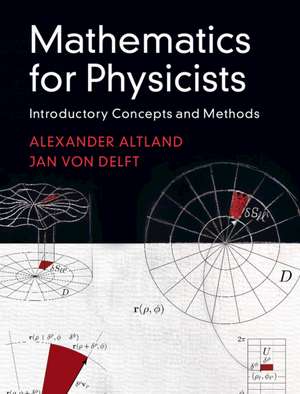Mathematics for Physicists: Introductory Concepts and Methods
Autor Alexander Altland, Jan von Delften Limba Engleză Hardback – 13 feb 2019
Preț: 354.56 lei
Nou
Puncte Express: 532
Preț estimativ în valută:
67.85€ • 72.55$ • 56.57£
67.85€ • 72.55$ • 56.57£
Carte disponibilă
Livrare economică 27 martie-10 aprilie
Livrare express 12-18 martie pentru 79.97 lei
Preluare comenzi: 021 569.72.76
Specificații
ISBN-13: 9781108471220
ISBN-10: 1108471226
Pagini: 720
Ilustrații: 313 b/w illus.
Dimensiuni: 193 x 253 x 37 mm
Greutate: 1.68 kg
Editura: Cambridge University Press
Colecția Cambridge University Press
Locul publicării:Cambridge, United Kingdom
ISBN-10: 1108471226
Pagini: 720
Ilustrații: 313 b/w illus.
Dimensiuni: 193 x 253 x 37 mm
Greutate: 1.68 kg
Editura: Cambridge University Press
Colecția Cambridge University Press
Locul publicării:Cambridge, United Kingdom
Cuprins
Preface; Part I. Linear Algebra: 1. Mathematics before numbers; 2. Vector spaces; 3. Euclidean geometry; 4. Vector product; 5. Linear maps; 6. Determinants; 7. Matrix diagonalization; 8. Unitarity and hermiticity; 9. Linear algebra in function spaces; 10. Multilinear algebra; Problems: linear algebra; Part II. Calculus: 1. Differentiation of one-dimensional functions; 2. Integration of one-dimensional functions; 3. Partial differentiation; 4. Multi-dimensional integration; 5. Taylor series; 6. Fourier calculus; 7. Differential equations; 8. Functional calculus; 9. Calculus of complex functions; Problems: calculus; Part III. Vector Calculus: 1. Curves; 2. Curvilinear coordinates; 3. Fields; 4. Introductory concepts of differential geometry; 5. Alternating differential forms; 6. Riemannian differential geometry; 7. Case study: differential forms and electrodynamics; Problems: vector calculus; Solutions: linear algebra; Solutions: calculus; Solutions: vector calculus; Index.
Recenzii
'A concise and engaging exposition of the mathematics necessary for physics students.' Juan Maldacena, Institute for Advanced Study
'… an outstanding addition to the existing stock of books on mathematical methods. It is rigorous, yet readable, and up to date, covering topics like differential forms, which are more and more in use in many areas of physics. An invaluable part of the book that contributes greatly to its pedagogical mission is the vast collection of exercises and their solutions.' R. Shankar, Yale University
'This book takes the physics student along a well-planned trip through mathematics from high school geometry to graduate-level tensor calculus. The key concepts are introduced with a degree of care and precision that is unusual in a book for physicists - but the precision is well motivated, so not at all intimidating. The book is up to date in its contents, especially as it includes the calculus of differential forms, now an essential tool in the professional physicist's toolbox.' Michael Stone, University of Illinois
'It contains all the material required in the undergraduate curriculum and emphasises a pedagogical strategy that presents a unified approach of concepts and methods, whereas most mathematics books for physicists tend to concentrate on methods.' Mike Glazer, Acta Crystallographica
'… an outstanding addition to the existing stock of books on mathematical methods. It is rigorous, yet readable, and up to date, covering topics like differential forms, which are more and more in use in many areas of physics. An invaluable part of the book that contributes greatly to its pedagogical mission is the vast collection of exercises and their solutions.' R. Shankar, Yale University
'This book takes the physics student along a well-planned trip through mathematics from high school geometry to graduate-level tensor calculus. The key concepts are introduced with a degree of care and precision that is unusual in a book for physicists - but the precision is well motivated, so not at all intimidating. The book is up to date in its contents, especially as it includes the calculus of differential forms, now an essential tool in the professional physicist's toolbox.' Michael Stone, University of Illinois
'It contains all the material required in the undergraduate curriculum and emphasises a pedagogical strategy that presents a unified approach of concepts and methods, whereas most mathematics books for physicists tend to concentrate on methods.' Mike Glazer, Acta Crystallographica
Notă biografică
Descriere
Introduces fundamental concepts and computational methods of mathematics from the perspective of physicists.
